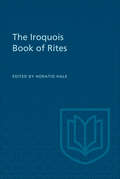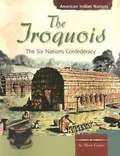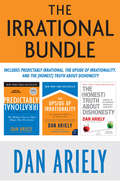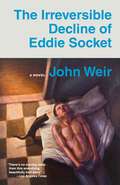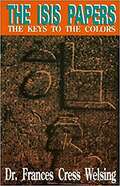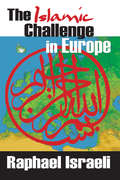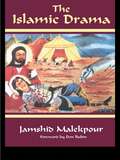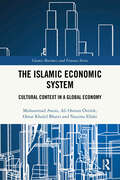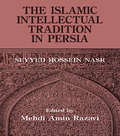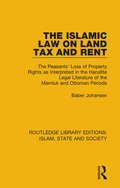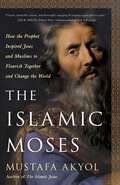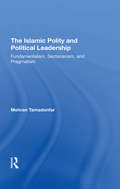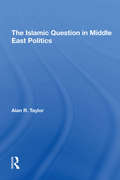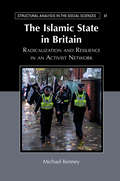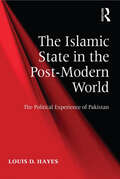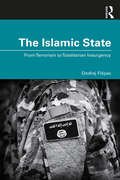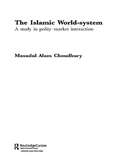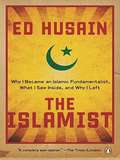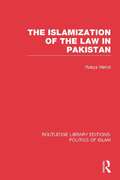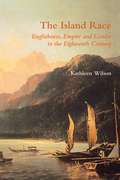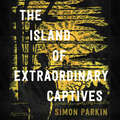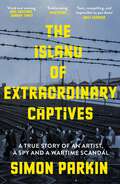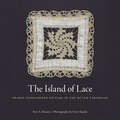- Table View
- List View
The Iroquois Book of Rites (Scholarly Reprint Series Edition)
by William Fenton Horatio HaleThe Iroquois Book of Rites, the most noteworthy of Hale's studies of the Iroquois, was translated and edited by him from two Indian manuscripts found at Grand River, with the help of informants and interpreters. The various parts of the Book of Rites throw valuable light on the political and social life, as well as the character and capacity, of the Iroquois. A long introduction by Hale contains essays on the League, on the Book of Rites, on the Condoling Council, and on the historical traditions, character, policy and language of the Iroquois. Hale's important book has long been out of print and in demand. It is reprinted here with a valuable introduction on Hale and the significance of his work by William N. Fenton of the New York State Museum and Science Service, University of the State of New York.
The Iroquois: The Six Nations Confederacy
by Jane Duden Mary EnglarProvides an overview of the past and present lives of the Iroquois Native Americans of New York and Ontario, tracing their customs, family life, history, culture, and government.
The Irrational Bundle
by Dan ArielyDan Ariely's three New York Times bestselling books on his groundbreaking behavioral economics research, Predictably Irrational, The Upside of Irrationality, and The (Honest) Truth About Dishonesty, are now available for the first time in a single volume,
The Irrational Bundle
by Dr Dan ArielyDan Ariely's three New York Times bestselling books on his groundbreaking behavioral economics research, Predictably Irrational, The Upside of Irrationality, and The (Honest) Truth About Dishonesty, are now available for the first time in a single volume.
The Irreversible Decline of Eddie Socket
by John WeirBefore the onset of his irreversible decline, Eddie Socket always suspected he was on the verge of something. Now that “something” has arrived in the form of Merrit Mather, an attractive older gentleman of impeccable taste in everything from sweaters to his numerous sexual conquests. That Merrit happens to be the lover of Eddie’s agitated boss, Saul, hardly fazes the smitten Eddie; that the elusive Merrit loses interest in Eddie with dizzying speed hardly dims his ardor. While Eddie continues his futile chase, he finds solace in his roommate, Polly, involved in her own implausible affair with a self-involved banker. Both Eddie and Polly eventually conclude that solitude is their best option. But even that is not possible as Eddie finds his life taking an unexpected turn—a turn that that serves as the catalyst for Eddie, love-ravaged Polly, and the indomitable Saul to reclaim their lives.First published in 1989 and winner of the 1990 Lambda Literary Award for Best Gay Debut Novel, The Irreversible Decline of Eddie Socket is one of the first novels to respond to the global AIDS crisis. A comedy of absurdist horror, it weaponizes the comic as a way of intensifying the tragic aspects of AIDS, which were especially acute in the early 1980s, and the scars of which are still visible today.
The Isis Papers: The Keys to the Colors
by Frances C. WelsingThis collection of essays written by Frances Cress Welsing over an 18 year period following the presentation and publication of "The Cress Theory of Color-Confrontation and Racism (White Supremacy)" which was a theoretical statement, a psychogenetic theory and world outlook on the origin and meaning of the global white supremacy system. This theory summarizes and clarifies the experience of non-white peoples on a planet dominated by people who classify themselves as 'white' and who are a minority of the world's people.
The Islamic Challenge in Europe
by Raphael IsraeliSince the World Trade Center attacks in New York on September 11, 2001, Europe has been plagued by Islamist attacks that have taken many lives and disrupted many services. Considerable attention has been paid to radical Islamist attacks on the United Kingdom, France, and Germany, but far less focus has been on the Islamist extremist impact on the rest of Europe. This book warns all Europeans, but Middle Easterners as well, that they are not immune to terror. That terror is confined to Jews and Israel is a myth. Muslim extremist attacks have taken place against other Muslim nations--as well as European nations in which Jewish influence or Israeli support is negligible. The waves of Muslim recrimination against the West have given rise to internal struggles within the Arab world played out in terrorist acts. Muslim brotherhoods have defined a global war against other religions, nations, and cultures that stray from the principles of fundamentalism--a cultural and military jihad. Just where religious identity supervenes national identity has become a critical turning point. Israeli's book shows that the line between moderates and extremists within the Islamic fold is vague, ambiguous, and in certain situations non-existent. It draws attention to polls and public sentiments of the Islamic faithful, and emphasizes the Islamic attack on modernization and its cultural sources. This timely volume is addressed to those in the West who are not accustomed to thinking in apocalyptic terms. Israeli provides painstaking details of European responses to Islamist challenges, particularly those who prefer pragmatic compliance rather than response. He demonstrates that Islamic extremism continues to grow in the heartland of the European world. This is neither an optimistic nor pessimistic book; its disturbing message may be a wake-up call to some. It is a necessary read for those who want to go beyond news, opting for a more intellectual and comprehensive diet.
The Islamic Drama
by Jamshid MalekpourDescribed by the distinguished theatre director Peter Brook as 'a very powerful form of theatre', the Ta'ziyeh is the Islamic drama of Iran. This work examines the evolution of the Ta'ziyeh, which involved elements drawn from Zoroastrianaism, Mithraism, mythology, folklore and traditional forms of Iranian entertainment. In its final form, most of its elements - plot, character, thought, spectacle and song - derive from the Shi'a branch of Islam. Its main plot concerns the suffering and death of Imam Hussein, grandson of the Prophet of Islam. A special issue of the journal Israel Affairs.
The Islamic Economic System: Cultural Context in a Global Economy (Islamic Business and Finance Series)
by Muhammad Awais Ali Osman Öztürk Omar Khalid Bhatti Nazima EllahiIslamic Economics refers to financial aspects or monetary activities and processes, which adhere to Islamic standards and teachings. The Islamic Economic System relates to the hypothetical development of an economy whose individuals follow the Islamic faith. This book presents an interesting and timely narrative of the concepts of Islamic economics in the context of Islamic culture. Its purpose is to guide individuals and organizations towards a Shariah-based Islamic Economic System.It begins by introducing the Islamic Economic System; its historical origins are explained in the framework of the verses of the Holy Quran, and in light of the Shariah scholars and the philosophical thinkers of the mid-20th century. It discusses concepts such as the evolution of Islamic Fintech and Artificial Intelligence (AI); the relationship between Islamic corporate governance and Islamic Economics; the distribution of wealth in Islam; Islamic Social Finance; Islamic Economic practices in the banking industry, behavioural norms and moral foundations; and Islamic Economics in Organisation of Islamic Cooperation (OIC) and non-OIC countries. The author emphasizes the principles that set Islamic economics apart from traditional systems, grounded in Shariah evidence and highlights the role of Islamic principles in promoting overall business success and ethical practices in the banking industry, offering comparative analysis between Islamic and conventional models, as well as economic systems. Drawing on a rich array of sources, including the Quran and interviews with renowned religious scholars, the book provides a well-rounded and thoroughly researched argument.This book will serve as a valuable resource for academics, scholars, researchers, and organizations seeking to navigate the complexities of an interest-free economic system guided by Islamic principles.
The Islamic Intellectual Tradition in Persia
by Seyyed Hossein Nasr Mehdi Amin AminrazaviThis volume gathers together the numerous essays by the Iranian metaphysician and ontologist, Seyyed Hossein Nasr, on Islamic philosophers and the intricate relationship between Persian culture and its philosophical schools. Brought together into a single volume for the first time, these essays span four decades of Nasr's prolific and learned scholarship on the development of Islamic philosophy, as well as the general history of Islam, and expound his belief that philosophy is not merely a rational but a sacred activity.
The Islamic Law on Land Tax and Rent: The Peasants' Loss of Property Rights as Interpreted in the Hanafite Legal Literature of the Mamluk and Ottoman Periods (Routledge Library Editions: Islam, State and Society)
by Baber JohansenThis book, first published in 1988, argues that a close inspection of the development of Hanafite law in the Mamluk and Ottoman periods reveals changes in legal doctrine which were not restricted to civil transactions but also concerned the public law. It focuses in particular on the interrelated areas of property, rent and taxation of arable lands, arguing that changes in the relationship between tax and rent led to a redefinition of the concept of landed property, a concept at the very heart of the Islamic legal system. This title will be of particular interest to students of Islamic history.
The Islamic Moses: How the Prophet Inspired Jews and Muslims to Flourish Together and Change the World
by Mustafa AkyolA theological and historical exploration of the connection between Islam and Judaism through the single most-mentioned character in the Quran: Moses.There is one human mentioned in the Quran more than any other: Moses. Why is it that the Jewish prophet dominates the Islamic scripture? Because he is the role model for Muhammad, Islam’s own prophet. Because Islam, just like Christianity, is deeply intertwined with Judaism — although surprisingly little attention has been given to this fascinating connection between the two religions.Author and journalist Mustafa Akyol takes readers on a theological and historical walk through that much-neglected side of the Abrahamic triangle: the Judeo-Islamic tradition. Using Moses’ presence in the Quran as a jumping-off point, Akyol explores the first historical encounter between Muslims and Jews, the creative symbiosis and mutual enrichment that occurred between the two belief systems in medieval times, and the modern emergence, development, and perception of the two religions.At a time of bitter conflict in the Middle East, The Islamic Moses dives into the older, deeper, and often unexpectedly brighter story of Jews and Muslims. Readers of any background will be surprised by the common historical and theological ground that exists between the two religions, and will come away with a better understanding of both.
The Islamic Polity And Political Leadership: Fundamentalism, Sectarianism, And Pragmatism
by Mehran TamadonfarThis book is employed for the study of the Islamic polity and political leadership and examines the basic features of the Islamic polity. It provides a theoretical framework for the study of political authority in the Islamic world signifying individual leaders' characteristics.
The Islamic Question In Middle East Politics
by Alan R TaylorThis book provides an overview of the origins, development, and eventual encounters of secular nationalism and the various manifestations of the Islamic reform movement. The scope of the book is restricted to the Middle East (Turkey, Iran, and the Arab states).
The Islamic State in Britain: Radicalization and Resilience in an Activist Network (Structural Analysis in the Social Sciences)
by Michael KenneyDrawing on extensive field research with activists on the streets of London, Michael Kenney provides the first ethnographic study of a European network implicated in terrorist attacks and sending fighters to the Islamic State. For over twenty years, al-Muhajiroun (Arabic for 'the Emigrants') strived to create an Islamic state in Britain through high-risk activism. A number of Emigrants engaged in violence, while others joined the Islamic State in Iraq and Syria. Kenney explains why young Britons joined the Emigrants, how they radicalized and adapted their activism, and why many of them eventually left. Through an innovative mix of ethnography and network analysis, Kenney explains the structure and processes behind this outlawed network and explores its remarkable resilience. What emerges is a complex, nuanced portrait that demystifies the Emigrants while challenging conventional wisdom on radicalization and countering violent extremism.
The Islamic State in the Post-Modern World: The Political Experience of Pakistan
by Louis D. HayesThe Islamic State in the Post-Modern World is a study of the political development of Pakistan. This study consists of three parts. The first addresses the concept of the 'state' as it has evolved historically. The approach is comparative and involves a brief review of Islamic political theory. The second part of this section is the modern state, i.e., the Westphalian model. The territorial state is still the standard although it has been evolving in new directions for some time. The second section focuses on the creation of Pakistan as an experiment in bridging the gulf between the demands of the modern state and the philosophical-spiritual attraction of the Islamic model. In addition to constitutional issues, the discussion also includes political forms, i.e., the machinery of daily government and the appropriateness of democratic methods, elections, legislative process, and political parties, to achieve Islamic ends. The third part considers international issues from the beginning of the twenty-first century especially the conflicts in Iraq and Afghanistan. Despite its 'partnership' role with the US in the war on terror, Pakistan has been consistently marginalized. Pakistan’s problems are exacerbated by the conflict over Kashmir, a vestigial remnant of Pakistan’s continuous, and largely unsuccessful, efforts at self-identification.
The Islamic State: From Terrorism to Totalitarian Insurgency
by Ondrej FilipecThe Islamic State analyzes the transformation of ISIS (Daesh) from an underground insurgent organization to a quasi-state entity. It traces the genesis and evolution of what may be interpreted as a revolutionary war aimed at the creation and expansion of a new society and world order in the ruins of Syria and Iraq. This book: Analyzes the regime’s totalitarian features including structure, ideology, propaganda, and violence; Examines its ideology with a focus on radical Islamism and Salafi-jihadism; Studies the economics behind its continued existence; and Explores the attitude of key state and non-state actors, especially Russia, USA, and the Global Coalition, towards Daesh. An indispensable guide to the study of modern terrorism, this book will be of great interest to students and researchers of Middle East studies, terrorism, with a focus on ISIS, military and strategic studies, politics and international relations, as well as general readers.
The Islamic World-System: A Study in Polity-Market Interaction (Routledgecurzon Advances In Middle East And Islamic Studies)
by Masudul Alam ChoudhuryThis highly original book presents an alternative vision of globalization and explores the epistemology, derived from the Qur'an and the Prophetic guidance Sunnah, that underpins the systemic unity at the heart of the Islamic concept of world-system. Choudhury's investigation reveals the ethical foundations that influence the development of law, markets and social contract in Islamic societies. He then applies his methodology to issues and problems such as property rights, money, political economy, technology diffusion, microenterprise development and asset evaluation.
The Islamist
by Ed HusainEd Husain's The Islamist is the shocking inside story of British Islamic fundamentalism, told by a former radical. 'When I was sixteen I became an Islamic fundamentalist. Five years later, after much emotional turmoil, I rejected fundamentalist teachings and returned to normal life and my family. As I recovered my faith and mind, I tried to put my experiences behind me, but as the events of 7/7 unfolded it became clear to me that Islamist groups pose a threat to this country that we - Muslims and non-Muslims alike - do not yet understand. ' 'Why are young British Muslims becoming extremists? What are the risks of another home-grown terrorist attack on British soil? By describing my experiences inside these groups and the reasons I joined them, I hope to explain the appeal of extremist thought, how fanatics penetrate Muslim communities and the truth behind their agenda of subverting the West and moderate Islam. Writing candidly about life after extremism, I illustrate the depth of the problem that now grips Muslim hearts and minds and lay bare what politicians and Muslim 'community leaders' do not want you to know. ' 'A complete eye-opener' The Times 'Captivating, and terrifyingly honest' Observer 'Persuasive and stimulating' Martin Amis 'Read this articulate and impassioned book' Simon Jenkins, Sunday Times Ed Husain was an Islamist radical for five years in his late teens and early twenties. Having rejected extremism he travelled widely in the Middle East and worked for the British Council in Syria and Saudi Arabia. Husain received wide and various acclaim for The Islamist, which was shortlisted for the Orwell Prize for political writing and the PEN/Ackerley Prize for literary autobiography, amongst others.
The Islamization of the Law in Pakistan (Routledge Library Editions: Politics of Islam)
by Rubya MehdiThis is a detailed, critical study of the reforms which have been made in recent years to the law in the State of Pakistan with the ostensible objective of bringing it into accord with the requirements of Islam. Special emphasis is given to the period from 1977 when General Zia ul Haque adopted a period of Islamization. This is a field of investigation of considerable importance both for the advancement of legal and political theory and for practical purposes, especially as regards human rights. The author, trained both in Pakistan law and the concepts and practice of Islamic law, has been able to advance significantly our understanding of the doctrinal developments documented in this book. First published in 1994.
The Island Chumash: Behavioral Ecology of a Maritime Society
by Douglas J. KennettAn archaeological and climatological analysis of how environmental change affected the evolution of social complexity among Chumash hunter-gatherers of southern California.
The Island Race: Englishness, Empire and Gender in the Eighteenth Century
by Kathleen WilsonRooted in a period of vigorous exploration and colonialism, The Island Race: Englishness, empire and gender in the eighteenth century is an innovative study of the issues of nation, gender and identity. Wilson bases her analysis on a wide range of case studies drawn both from Britain and across the Atlantic and Pacific worlds. Creating a colourful and original colonial landscape, she considers topics such as: * sodomy* theatre* masculinity* the symbolism of Britannia * the role of women in war. Wilson shows the far-reaching implications that colonial power and expansion had upon the English people's sense of self, and argues that the vaunted singularity of English culture was in fact constituted by the bodies, practices and exchanges of peoples across the globe. Theoretically rigorous and highly readable, The Island Race will become a seminal text for understanding the pressing issues that it confronts.
The Island of Extraordinary Captives: A True Story of an Artist, a Spy and a Wartime Scandal
by Simon ParkinA gripping untold war story: using exclusive new archive material, letters and diaries, this is the story of the prisoners of war in internment camps during the Second World War.The police came for Peter Fleischmann in the early hours. It reminded the teenager of the Gestapo's moonlit roundups he had narrowly avoided at home in Berlin. Now, having endured a perilous journey to reach England - hiding from the rampaging Nazi thugs at his orphanage, boarding a Kindertransport to safety - here the aspiring artist was, on a ship bound for the Isle of Man, suspected of being a Nazi spy. What had gone wrong?In May 1940, faced with a country gripped by paranoia, Prime Minister Winston Churchill ordered the internment of all German and Austrian citizens living in Britain. Most, like Peter, were refugees who had come to the country to escape Nazi oppression. They were now imprisoned by the very country in which they had staked their trust. Painstakingly researched from dozens of unpublished first-hand accounts and previously classified documents, The Island of Extraordinary Captives tells, for the first time, the story of history's most astonishing internment camp and of how a group of world-renown artists, musicians and academics came to be seen as 'enemy aliens'. The Island of Extraordinary Captives is the story of a battle between fear and compassion at a time of national crisis. It reveals how Britain's treatment of refugees during the Second World War led to one of the nation's most shameful missteps, and how hope and creativity can flourish in even the most challenging circumstances.(P) 2022 Hodder & Stoughton Limited
The Island of Extraordinary Captives: A True Story of an Artist, a Spy and a Wartime Scandal
by Simon Parkin*An OBSERVER, TABLET, NEW STATESMAN and GUARDIAN SATURDAY MAGAZINE "Books of 2022" pick *The police came for Peter Fleischmann in the early hours. It reminded the teenager of the Gestapo's moonlit roundups he had narrowly avoided at home in Berlin. Now, having endured a perilous journey to reach England - hiding from the rampaging Nazi thugs at his orphanage, boarding a Kindertransport to safety - here the aspiring artist was, on a ship bound for the Isle of Man, suspected of being a Nazi spy. What had gone wrong?In May 1940, faced with a country gripped by paranoia, Prime Minister Winston Churchill ordered the internment of all German and Austrian citizens living in Britain. Most, like Peter, were refugees who had come to the country to escape Nazi oppression. They were now imprisoned by the very country in which they had staked their trust. Painstakingly researched from dozens of unpublished first-hand accounts and previously classified documents, The Island of Extraordinary Captives tells, for the first time, the story of history's most astonishing internment camp and of how a group of world-renown artists, musicians and academics came to be seen as 'enemy aliens'. The Island of Extraordinary Captives is the story of a battle between fear and compassion at a time of national crisis. It reveals how Britain's treatment of refugees during the Second World War led to one of the nation's most shameful missteps, and how hope and creativity can flourish in even the most challenging circumstances.
The Island of Lace: Drawn Threadwork on Saba in the Dutch Caribbean
by Eric A. EliasonNicknamed the “Island of Lace,” the Caribbean island of Saba is the smallest special municipality in the Netherlands. Folklorist Eric A. Eliason, at the behest of the president of the Saba Lace Ladies’ Foundation and Saba’s director of tourism, traveled to the island with the intent to document the history and patterns of Saba lace. Born out of his research, The Island of Lace tells the story of lacework’s central role in Saba’s culture, economy, and history. Accompanied by over three hundred of Scott Squire’s intimate photographs of lace workers and their extraordinary island society, this volume brings together in one place an as-complete-as-possible catalog of the rich designs worked by Saban women. For 130 years, the practice of drawn threadwork—also known as Spanish work, fancy work, lacework, or Saba lace—has shaped the lives of Saban women. And yet, as the younger generation moves away from the island, it still survives. Sabans use drawn threadwork to symbolize the uniqueness of their island and express the ingenuity, diligence, bold inventiveness, pride in workmanship, love of beauty, and respect for tradition that define the Saban spirit. Along with recording and honoring the creative legacy of generations of Saban women, this book serves as a guide to folk-art lace patterns from Saba so that practitioners can reference and perhaps re-create this work. The Island of Lace is the most comprehensive volume on this singular tradition ever published.
